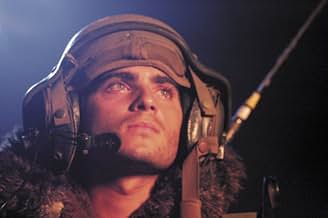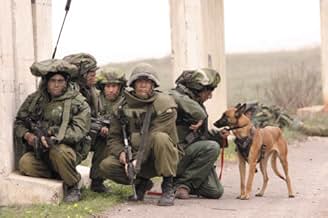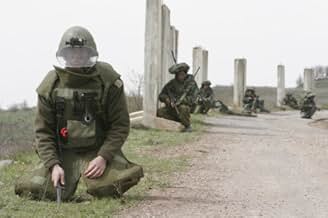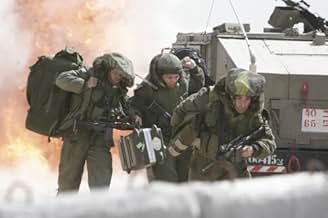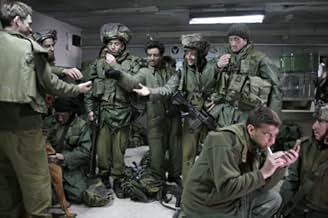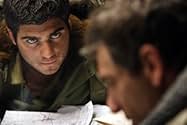IMDb रेटिंग
6.7/10
4.9 हज़ार
आपकी रेटिंग
अपनी भाषा में प्लॉट जोड़ेंThe story of a group of Israeli soldiers stationed in an outpost prior to the withdrawal of forces of 2000.The story of a group of Israeli soldiers stationed in an outpost prior to the withdrawal of forces of 2000.The story of a group of Israeli soldiers stationed in an outpost prior to the withdrawal of forces of 2000.
- 1 ऑस्कर के लिए नामांकित
- 5 जीत और कुल 9 नामांकन
Arthur Perzev
- Yonatan Shpitzer
- (as Arthur Faradjev)
Zohar Strauss
- Rossman
- (as Zohar Shtrauss)
Ya'akov Ahimeir
- Self
- (as Yaakov Ahimeir)
कहानी
क्या आपको पता है
- ट्रिवियाThe lead actor, Oshri Cohen (Liraz), did not serve on the IDF (Israeli Defence Force).
- कनेक्शनFeatured in The 80th Annual Academy Awards (2008)
फीचर्ड रिव्यू
Right-wing audiences have criticized "Beaufort" for being left-winged, while left-wing audiences have criticized the movie for being right-winged. Immediately that should tell you this is a movie worth watching.
Like all great war films, "Beaufort" avoids situational politics and instead focuses on the broader, universal issue of war which all sides can agree upon: war is hell. Or specifically in this case, war is pointless hell. Here we have an excellent illustration; "Beaufort" is the story of a handful of soldiers who fight admirably to defend a fort, simply so that they can abandon it as planned a few days later. Folks, it don't get any more pointless than that. I would tip my hat to the genius who came up with such a great metaphor, but the funny thing is that the story came straight out of history.
(Note: although this film depicts the Israeli withdrawal from Castle Beaufort which was returned to Lebanon in 2000, it was actually filmed at a different fortress at the Golan Heights in Syrian territory currently held by Israel.)
Joseph Cedar directs this film in a tense, claustrophobic way with narrow, labyrinthine corridors that burrow deep into the mountain. I was instantly reminded of the classic submarine film "Das Boot" and wasn't surprised one bit when I read that Cedar was highly influenced by that film. "Beaufort" shares several qualities with "Das Boot" such as the facelessness of the enemy (all we see are the incoming mortars & missiles), the youth & inexperience of the soldiers (Beaufort's commander is 22 and most of the soldiers are 18- 20 years old), and of course the constricting, suffocating feeling of being stuck in a steel tube while, outside, the powers that be are deciding your fate.
One notable difference between "Beaufort" and "Das Boot" are the infrequent but powerful shots of the gorgeous landscape, the humbling presence of the 12th century ruins, and other scenes of nature which lend a positive breath of fresh air to an otherwise dismal setting. This, I'm sure, was very deliberate on the part of the director, and at one point there's a nice speech where one soldier says to another, "This will all be a tourist attraction, and you can bring your girlfriend here and tell her this is where Outpost Green once was."
And that, to me, is what separates "Beaufort" from the standard "war is hell" stories. Regardless of how the story ends up, you get a feeling that eventually the majesty of nature will prevail--or should I say the stupidity of humans will fail. Same thing, I guess.
Peculiar highlights of this film include a powerful, sad song sung by one of the soldiers in the barracks, and one of the cutest war dogs ever. (And if, like me, you always cringe at animals being used in films that aren't regulated by the AHA or RSPCA, don't worry I don't believe there was any animal cruelty here.)
Other great (anti-)war films that focus on the psychology of the soldier rather than the action of battle include: the aforementioned "Das Boot" set entirely in a German submarine, "None But the Brave" about an American & a Japanese platoon each stranded on a remote island together, and an excellent war-drama-comedy from Korea called "Welcome to Dongmakgol" about N & S Korean enemies meeting in a remote village where none of the villagers are aware that a war is going on.
All of these great films can be viewed free of politics if you just ignore the uniforms. Both right-wingers & left wingers alike can find common ground with the universal thought (to quote ex-Marine talk radio host Kim Peterson), "the only point of war is to kill people and break things!"
Like all great war films, "Beaufort" avoids situational politics and instead focuses on the broader, universal issue of war which all sides can agree upon: war is hell. Or specifically in this case, war is pointless hell. Here we have an excellent illustration; "Beaufort" is the story of a handful of soldiers who fight admirably to defend a fort, simply so that they can abandon it as planned a few days later. Folks, it don't get any more pointless than that. I would tip my hat to the genius who came up with such a great metaphor, but the funny thing is that the story came straight out of history.
(Note: although this film depicts the Israeli withdrawal from Castle Beaufort which was returned to Lebanon in 2000, it was actually filmed at a different fortress at the Golan Heights in Syrian territory currently held by Israel.)
Joseph Cedar directs this film in a tense, claustrophobic way with narrow, labyrinthine corridors that burrow deep into the mountain. I was instantly reminded of the classic submarine film "Das Boot" and wasn't surprised one bit when I read that Cedar was highly influenced by that film. "Beaufort" shares several qualities with "Das Boot" such as the facelessness of the enemy (all we see are the incoming mortars & missiles), the youth & inexperience of the soldiers (Beaufort's commander is 22 and most of the soldiers are 18- 20 years old), and of course the constricting, suffocating feeling of being stuck in a steel tube while, outside, the powers that be are deciding your fate.
One notable difference between "Beaufort" and "Das Boot" are the infrequent but powerful shots of the gorgeous landscape, the humbling presence of the 12th century ruins, and other scenes of nature which lend a positive breath of fresh air to an otherwise dismal setting. This, I'm sure, was very deliberate on the part of the director, and at one point there's a nice speech where one soldier says to another, "This will all be a tourist attraction, and you can bring your girlfriend here and tell her this is where Outpost Green once was."
And that, to me, is what separates "Beaufort" from the standard "war is hell" stories. Regardless of how the story ends up, you get a feeling that eventually the majesty of nature will prevail--or should I say the stupidity of humans will fail. Same thing, I guess.
Peculiar highlights of this film include a powerful, sad song sung by one of the soldiers in the barracks, and one of the cutest war dogs ever. (And if, like me, you always cringe at animals being used in films that aren't regulated by the AHA or RSPCA, don't worry I don't believe there was any animal cruelty here.)
Other great (anti-)war films that focus on the psychology of the soldier rather than the action of battle include: the aforementioned "Das Boot" set entirely in a German submarine, "None But the Brave" about an American & a Japanese platoon each stranded on a remote island together, and an excellent war-drama-comedy from Korea called "Welcome to Dongmakgol" about N & S Korean enemies meeting in a remote village where none of the villagers are aware that a war is going on.
All of these great films can be viewed free of politics if you just ignore the uniforms. Both right-wingers & left wingers alike can find common ground with the universal thought (to quote ex-Marine talk radio host Kim Peterson), "the only point of war is to kill people and break things!"
टॉप पसंद
रेटिंग देने के लिए साइन-इन करें और वैयक्तिकृत सुझावों के लिए वॉचलिस्ट करें
- How long is Beaufort?Alexa द्वारा संचालित
विवरण
- रिलीज़ की तारीख़
- कंट्री ऑफ़ ओरिजिन
- आधिकारिक साइटें
- भाषा
- इस रूप में भी जाना जाता है
- Thị Trấn Beaufort
- फ़िल्माने की जगहें
- उत्पादन कंपनियां
- IMDbPro पर और कंपनी क्रेडिट देखें
बॉक्स ऑफ़िस
- बजट
- $25,00,000(अनुमानित)
- US और कनाडा में सकल
- $1,02,591
- US और कनाडा में पहले सप्ताह में कुल कमाई
- $6,808
- 20 जन॰ 2008
- दुनिया भर में सकल
- $2,71,340
- चलने की अवधि2 घंटे 11 मिनट
- रंग
- ध्वनि मिश्रण
- पक्ष अनुपात
- 2.35 : 1
इस पेज में योगदान दें
किसी बदलाव का सुझाव दें या अनुपलब्ध कॉन्टेंट जोड़ें


